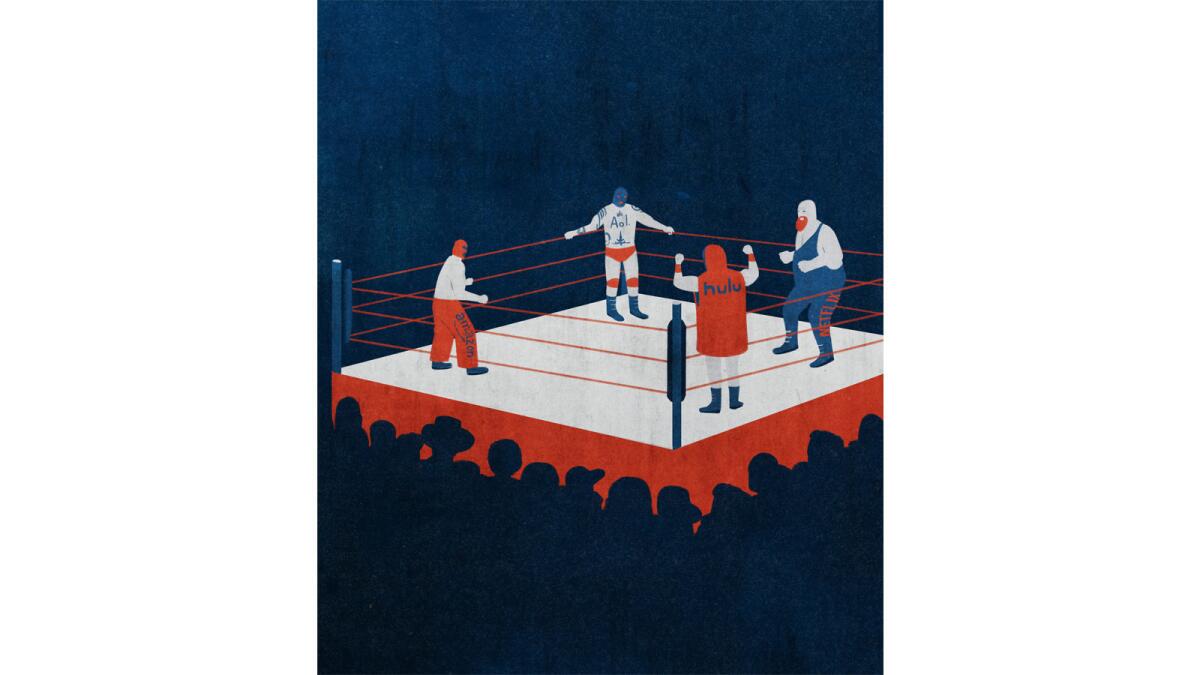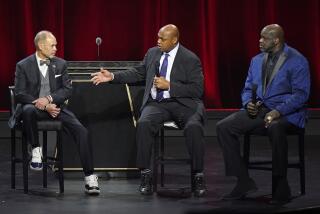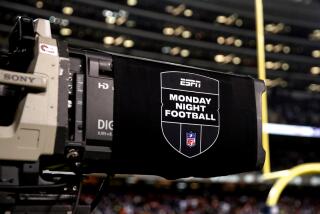Media monarchs have finally seen the future, and it is digital

Don’t be surprised if the future monarchs of media look a lot like the ones that rule today.
After spending several years on the defensive, traditional media giants are making bold moves to reinforce their dominance. With billions of dollars and their long-term survival at stake, major programmers have been shifting gears and are looking for ways to harness the power of digital media themselves.
This fall, two major programmers — HBO and CBS — announced subscription streaming services that would be offered directly to consumers.
HBO’s foray, expected to roll out next year, represents the first time the premium channel’s latest content would be legally available to viewers who do not subscribe to the top-tier pay-TV service. Many viewers cheered the development, figuring the HBO initiative in particular might set in motion the long-awaited breakup of the pay-TV bundle.
Not so fast, some experts said.
“The shiny, colorful, rainbow-filled unicorn world where people can order just the channels they want and nothing else is really just a fantasy world,” said Matt Smith, chief evangelist at Anvato, a Mountain View, Calif., technology firm. “The audience is shifting, but consumers are becoming pawns in the larger game.”
Media companies, including the Walt Disney Co., NBCUniversal and Time Warner Inc., would like to protect the established industry economics. But they recognize that they must evolve to remain relevant, particularly among younger audiences, the so-called digital natives who have never known a time without an Internet. And many don’t subscribe to pay TV. Ask 22-year-olds what device they consider most essential, and the answer is likely to be their smartphone — not the big-screen TV in the living room or even their laptop.
The change is not simply generational. Older Americans have been gravitating to streaming services too.
“This is the new world of TV,” said Roy Price, vice president of Amazon Studios. “The convenience of on-demand viewing just makes sense for a lot of people. A few years ago, it was a little exotic and forward-thinking to have your TV talk to the Internet and send you television shows, but today it is pretty normal.”
Nearly half of U.S. homes now have at least one TV connected to the Internet, enabling viewers to watch digital video from services such as Netflix, Hulu and Amazon.com, according to a recent report by the Leichtman Research Group. Even more Americans have watched videos on YouTube. In fact, so many people stream videos that Netflix and YouTube account for 43% of all Internet traffic during the peak prime-time evening hours, according to estimates by Internet traffic managers.
YouTube, owned by Google, boasts that users around the world upload 100 hours of video to its servers every minute and that each month people watch 6 billion hours of video on the site.
“We are in the midst of a massive change,” said Christopher Vollmer, a partner of PricewaterhouseCoopers’ Strategy& consulting unit. “People are getting their content from different platforms, different networks — and in different ways. The hours that people are spending consuming content continues to grow — and that trend is being driven by digital media.”
Consider that Netflix expects to generate $3.4 billion this year on its U.S. streaming service alone. It now has more than 37 million subscribers to its streaming service in the U.S.
Amazon doesn’t break out its customer numbers, but “there is no question the segment is growing,” Price said. “Just being able to set your own schedule and start your favorite show on your schedule, and watch it all the way through, has become mainstream. Streaming is rapidly catching on.”
A high-speed Internet connection has become a new gateway to entertainment.
But there is a rub: Entertainment companies derive much of their revenue from relationships forged in the 1980s. These companies, including Disney, 21st Century Fox, NBCUniversal and Nickelodeon-parent Viacom, collectively take in $47 billion a year by licensing their channels to cable, satellite-TV and telecommunications companies, according to consulting firm SNL Kagan. The distributors then sell huge packages of channels to consumers.
Those hefty programming fees underwrite the high cost of producing feature films and TV shows, and they have kept profits high at the media companies. Such lucrative partnerships with pay-TV operators have prevented media companies from blowing up their business models — until now.
But the sound of snip, snip has helped alter the television companies’ point of view too.
Companies have been bracing for more defections, with as many as a half-million households in the U.S. canceling their pay-TV subscriptions this year. The bounty of options has led many to conclude that they no longer need to fork over $100 a month or more for cable or satellite TV-subscriptions.
Meanwhile, the high-cost of premium cable service has prevented millions from watching first runs of HBO’s critically acclaimed programming, including such shows as “The Sopranos,” “Game of Thrones” and “Boardwalk Empire.” That will change with HBO’s streaming service, which is expected to be offered for about $14 a month, competing with such low-priced options as Netflix and Hulu Plus.
“We can’t ignore the growing opportunity,” Jeff Bewkes, chief executive of HBO-parent Time Warner, told Wall Street analysts this month.
CBS has also taken the digital plunge, last month launching a $5.99-a-month subscription service, CBS All Access, that enables Internet users to stream such shows as “NCIS,” “60 Minutes,” “The Good Wife” and “The Young and the Restless” as well as episodes of classics such as “Star Trek,” “Cheers,” “MacGyver” and “Melrose Place.” However, NFL games that air on the network won’t be included on the streaming service because CBS lacks the streaming rights.
The network has also introduced a free CBS News streaming product, CBSN, that allows people to get the latest headlines and reports on their mobile phones, tablets and computers.
“These new platforms are complementary to established mediums,” said Jim Lanzone, chief executive of CBS Interactive. “After all, the invention of television didn’t kill radio, and television didn’t kill movies. And the invention of the Internet has not killed television.”
Experts caution that HBO, CBS and others that offer their content “over-the-top,” via the Internet, bypassing the cable box, will do their best to avoid alienating their longtime partners, the pay-TV providers.
Time Warner’s Bewkes stressed that the HBO Internet offering would not be targeted at pay-TV customers. Instead, he said it would be designed to woo new customers among those who live in 10 million homes equipped with high-speed Internet — but not a pay-TV subscription.
He and other CEOs have financial interests to protect the lucrative, existing pay-TV model as they navigate the changes in audience behavior.
“The TV industry is still in this gray area,” said Albert Cheng, chief product officer for digital media for the Disney/ABC Television Group. “Every company has different business reasons for doing what they are doing, which is why we are seeing so much experimentation in terms of what content is available, when it is accessible and where it can be seen.”
For example, Disney, Fox and NBCUniversal jointly own the streaming site Hulu, which has long provided insights on consumption patterns — and which programs are most popular.
There are early indications that the established media companies are well positioned for the future.
After Time Warner last month announced that HBO would soon roll out a streaming option, the company’s stock gained ground. That same day, Netflix disappointed Wall Street when the company missed its third-quarter subscriber growth targets. That plus the HBO announcement resulted in Netflix’s stock dropping about 20%.
Satellite TV giants Dish Network and DirecTV and electronics giant Sony Corp. also have been busy preparing to defend their turf. They are designing small packages to sell to customers with high-speed Internet who want to stream traditional TV channels, such as ABC, ESPN and Discovery, over the Internet. DirecTV is working with Spanish-language broadcaster Univision Communications to tailor a small package of channels for Spanish speakers.
Chet Fenster, head of content for media investment agency MEC, summed it up this way:
“The established media companies will continue to be major players, but they will be standing alongside new brands that most people don’t even know their names yet,” Fenster said. “One thing we know from the history of media is there is strength in numbers. And there will always be a market for smart, scripted programming.”
More to Read
The complete guide to home viewing
Get Screen Gab for everything about the TV shows and streaming movies everyone’s talking about.
You may occasionally receive promotional content from the Los Angeles Times.







